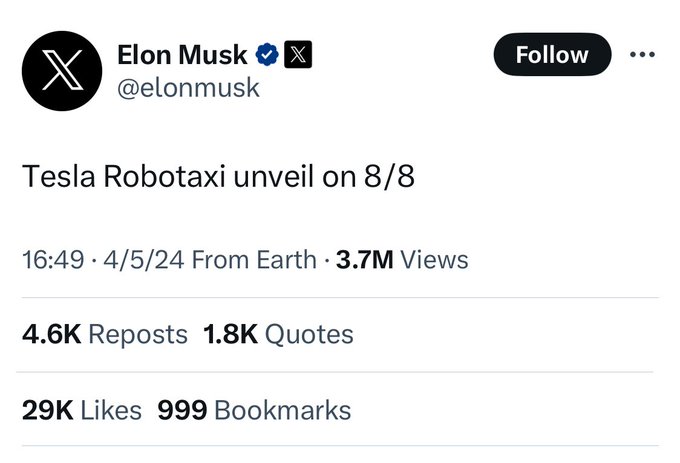When Elon Musk promised a big robotaxi reveal, we broke our no predictions rule and suggested the following possibilities:
To be blunt, the industry is nowhere near the level of self-driving functionality and Tesla in nowhere near being the leader in this field. Assuming we do not witness the company leapfrog the competition and unveil a major breakthrough in level 4 autonomy, what are we likely to see on August 8th?
3. Low level fake. A painstakingly choreographed drive-through of carefully mapped course with selective editing to cover the remaining glitches. (see Optimus.)
1. Nothing. Elon Musk will announce that the big reveal has been pushed back to make the product even more spectacular.
2. An Optimus Style non demonstration where Elon will haul out a barely functional prototype years behind the competition in terms of sophistication and will spend the rest of the time talking about how incredible the next iteration will eventually be.
4. High level fake. Everything in the low level fake plus a Mechanical Turk actually at the controls. Check out the right side of this video which was released to great fanfare.
From Bloomberg:
Tesla will now unveil robotaxis on Oct. 10, and the cars shown will only be prototypes. More affordable models that could juice sales won’t go into production until the first half of next year, at the earliest. A planned factory in Mexico is on pause until after the US presidential election in November, and a humanoid robot that Musk predicts will send Tesla’s valuation soaring won’t start selling until sometime in 2026.
Here's the rest of our original announcement.
Monday, April 8, 2024
If I had a slightly cynical attitude toward Elon Musk, I might be a bit suspicious of a couple of things here
First of all, there's the timing of this.
The
surprise Robo Taxi announcement certainly came at a fortuitous moment
for Musk. Before the news broke, Tesla was having a really bad, awful,
totally nogood year ...
... followed by a really bad, awful, totally nogood day thanks to the release of a Reuters story about the company ever so quietly canceling its plans for a low-cost EV. This was on top of tons of bad news about the companies inventory and other problems, not to mention the cybertruck managing to edge out the Ford Edsel as the ultimate cautionary tale of why not to overhype a new automobile.
At 4:49 in the afternoon, less than an hour after the stock dropped another 3.63%...
And one minute later...
Longtime
readers will be familiar with Musk's history of announcing incredible
breakthroughs, often just as one of his companies is about to go over a
cliff.
From May 25, 2022
About seven or eight years ago, Musk's promises started becoming unmoored not just from what his engineers were working on, but from what was even possible. As best I can tell, this started with the hyperloop.
[And before the rumbling starts again, though you have heard about hundreds of millions of dollars going into hyperloop companies, absolutely none of that money is going into Elon Musk s air cushion idea. Every proposal and protype you've seen has been for maglev. Companies like Virgin scrapped his concept but kept the name.]*
Part of the reason for these increasingly delusional boasts may just have been Musk getting high on his own supply.** Take someone with messianic tendencies, give them a full-bore cult of personality, and have even the most respectable journalists refer to him as a real life Tony Stark. You know it's going to go to a guy's head.
But these fantastic claims also served his financial interest. The huge run up in the stock of Tesla came after the narrative had shifted to over-the-top fantasy.
Maintaining his current fortune requires Musk to keep these fantasies vivid in the minds of fans and investors. People have to believe that the Tesla model after next will be a flying exoskeleton that can blow shit up.
To
be blunt, the industry is nowhere near the level of self-driving
functionality and Tesla in nowhere near being the leader in this field.
Assuming we do not witness the company leapfrog the competition and
unveil a major breakthrough in level 4 autonomy, what are we likely to
see on August 8th?
1. Nothing. Elon Musk will announce that the big reveal has been pushed back to make the product even more spectacular.
2.
An Optimus Style non demonstration where Elon will haul out a barely
functional prototype years behind the competition in terms of
sophistication and will spend the rest of the time talking about how
incredible the next iteration will eventually be.
3. Low level
fake. A painstakingly choreographed drive-through of carefully mapped
course with selective editing to cover the remaining glitches. (see
Optimus.)
4. High level fake. Everything in the low level fake
plus a Mechanical Turk actually at the controls. Check out the right
side of this video which was released to great fanfare.
Musk later added a note that the robot was not actually operating autonomously but of course, he wasn't trying to mislead anyone.
* In the two years since this post, those hundreds of millions have been long been burned through with the biggest and best financed Hyperloop One/Virgin Hyperloop finally shuttering its airlock last year.
** And we now know getting high on a lot of other things as well.



